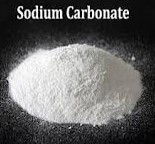Sodium carbonate, also known as soda ash or washing soda, is a versatile inorganic compound with a wide range of applications across various industries. Its chemical formula, Na2CO3, indicates its composition of sodium (Na), carbon (C), and oxygen (O). In this blog post, we will delve into the properties, uses, and significance of sodium carbonate in our daily lives.
Properties of Sodium Carbonate:<br />Sodium carbonate is a white, crystalline solid with a high melting point. It is highly soluble in water, resulting in a strongly alkaline solution. This compound can absorb moisture from the air, and it is hygroscopic. Additionally, sodium carbonate is an effective buffering agent, helping to maintain stable pH levels.
Industrial Applications:
Glass Manufacturing: Sodium carbonate plays a crucial role in the glass industry. It serves as a flux, reducing the melting point of silica (SiO2) and facilitating the formation of glass. The compound also aids in the removal of impurities from the molten glass, resulting in a clearer and more transparent product.
Detergents and Cleaning Products: Sodium carbonate is a key ingredient in laundry detergents and various cleaning products. Its alkaline nature allows it to act as a powerful cleaning agent by breaking down grease, oil, and stains. It enhances the effectiveness of soaps and detergents, particularly in hard water conditions.
Water Treatment: The compound is used in water treatment processes to adjust pH levels and remove impurities. Sodium carbonate can neutralize acidic water, making it suitable for consumption and industrial purposes. It also aids in the precipitation and removal of calcium and magnesium ions, which cause water hardness.
pH Regulation: Sodium carbonate is commonly employed as a buffering agent in various industries, including the pharmaceutical and food sectors. It helps maintain a stable pH range in solutions, preventing drastic changes in acidity or alkalinity.
Paper Manufacturing: Sodium carbonate is utilized in the paper industry during the bleaching process. It helps remove lignin, a complex organic substance, from wood pulp, resulting in brighter and more durable paper products.
Other Applications:
Apart from its industrial uses, sodium carbonate finds applications in other areas as well:
Cooking: Sodium carbonate, also known as culinary ash or soda ash, is occasionally used in cooking processes. It can aid in the browning of certain food items, such as pretzels, by promoting the Maillard reaction.
pH Adjustments in Pools: Sodium carbonate is sometimes employed as a pH increaser in swimming pools and spas. It can effectively raise the pH of pool water, ensuring optimal water quality for swimmers.
Conclusion:&amp;lt;br />Sodium carbonate is a remarkable compound with a diverse range of applications. Its versatility stems from its alkaline properties, which make it ideal for various industrial processes and everyday uses. From glass manufacturing to water treatment and cleaning products, sodium carbonate continues to play an essential role in our modern society. By understanding its properties and harnessing its potential, we can fully appreciate the significance of this compound in our daily lives.
pH Adjustments in Swimming Pools: Sodium carbonate, also known as soda ash, is commonly used to increase the pH level in swimming pools and maintain proper water balance. It helps prevent corrosion of pool equipment and provides a comfortable swimming environment.
pH Stabilizer in Swimming Pool Test Kits: Sodium carbonate is included in some swimming pool test kits to serve as a pH stabilizer. It ensures accurate pH measurements by preventing fluctuations in the water’s acidity or alkalinity.
Food Additive: is approved for use as a food additive and can be found in certain food products. It is used as a raising agent in baking, helping dough to rise. However, it is important to note that it should be used in limited quantities and with caution, as excessive consumption can lead to health issues.
pH Regulation in Aquariums:is utilized in aquariums to adjust and stabilize the pH levels of the water. It helps maintain an optimal environment for aquatic organisms.
Metal Cleaning and Restoration:can be used as a cleaning agent for removing grease, oil, and rust from metal surfaces. It is often employed in the restoration of antique metal items and artifacts.
pH Adjustments in Soil: can be used to adjust the pH of soil, particularly in cases where the soil is too acidic. It helps raise the pH level, making the soil more suitable for certain plants and crops.
Photography: is used in some photographic processes, such as developing and fixing solutions. It aids in the development of photographic films and prints.
Fire Extinguisher Agent: can be used as an ingredient in certain types of fire extinguishers. When heated, it releases carbon dioxide, which helps suppress flames by displacing oxygen.
It’s important to note that while has numerous applications, it should be handled with care and used in appropriate quantities in accordance with safety guidelines.
to watch polymers click here.


